
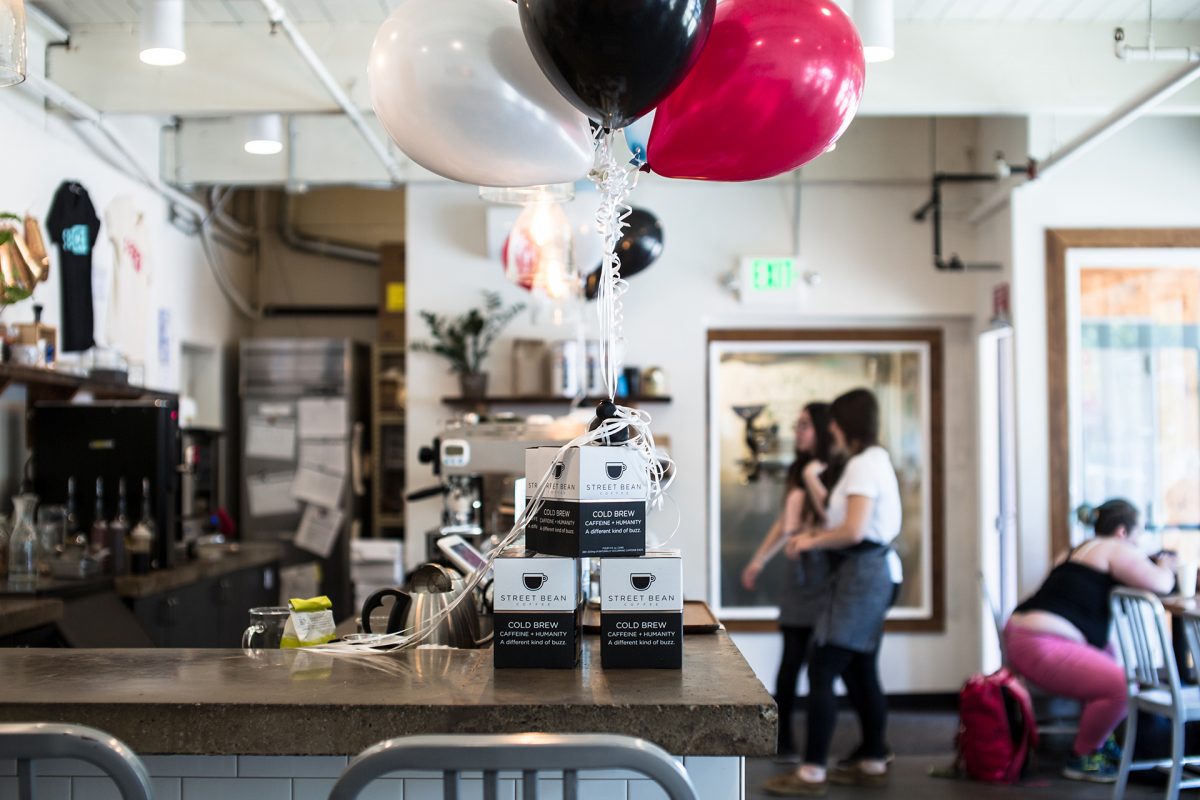
Walking into this Belltown, Seattle, cafe feels like walking into any other coffee shop. Large, sliding windows let in a ton of natural light. Wooden tables and chairs and local art furnish the interior of the shop. Happy baristas greet me from behind a Mahlkönig K30 grinder and a La Marzocco Linea PB. A mixture of young professionals, street kids, and tourists exploring the neighborhood are among the patrons. A long row of tall boy-ish cans of cold brew line the entire counter, announced proudly by a balloon banner reading “COLD BREW” in gold letters along the back wall. Balloons adorn each end of the bar, as well. Walking in, you’d think this was just another coffee shop—and one that was really excited about cold brew.
Street Bean Coffee Roasters is leagues more than that, though. Street Bean does far more than just prepare and serve coffee for anyone who visits. This is a coffee shop that offers the building blocks necessary for disenfranchised youth—a demographic of Seattle’s population often ignored—to get back on their feet. At Street Bean, you will not be turned away or looked down upon whether you’re an aspiring employee or a patron coming in to try something new. The pressure to fit into the elite aesthetic of specialty coffee, as we know it, is non-existent.
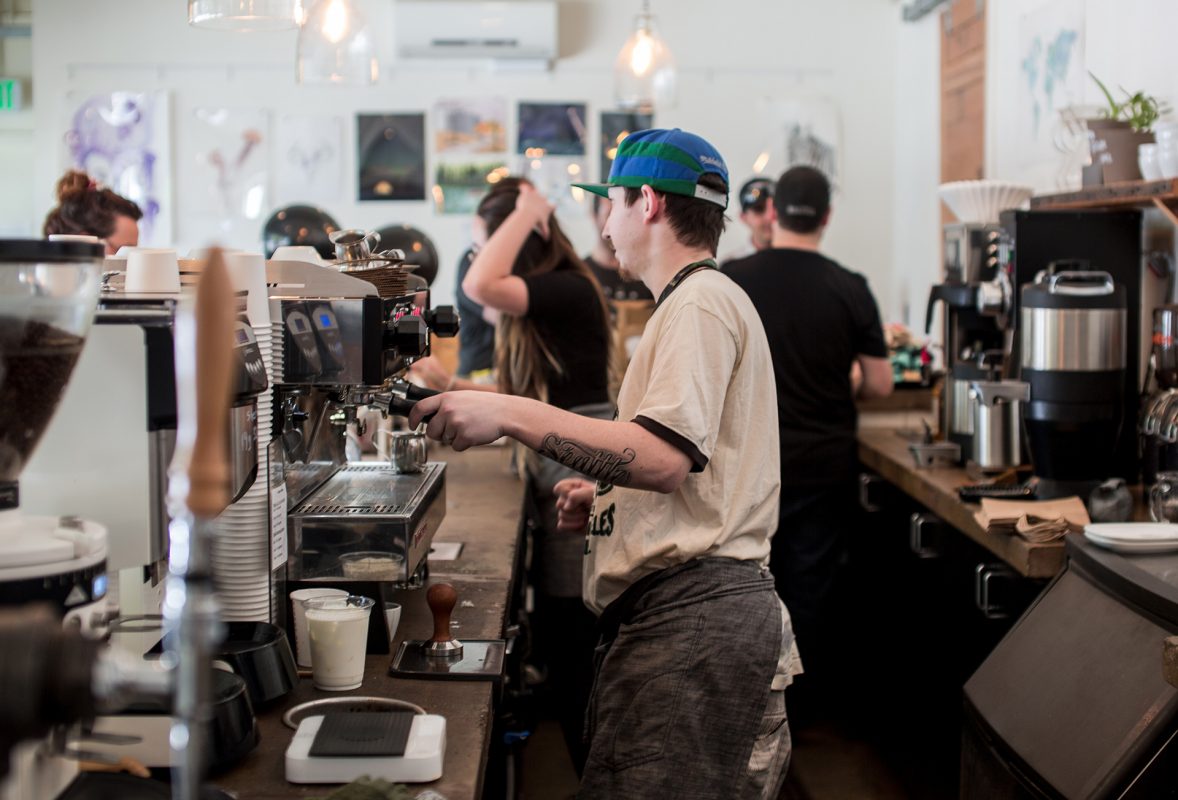
Street Bean’s purpose is to provide job experience and relevant, foundational skills to young people wanting to exit a street-involved life through coffee training, Street Bean Director of Operations Sean McDonald tells me. The coffee shop is part of a larger non-profit organization called, New Horizons, which offers services like case management, housing, job placement, and more, to Seattle youth in need.
“There are preconceived notions that homeless youth are runaways or bad kids,” says McDonald. “Some were pushed out of their homes due to lifestyle or grew up in homelessness. We try to be aware of the systemic issues of perpetual homelessness in Seattle.”
I was personally invested in learning more about Street Bean because of the story’s familiarity—I grew up cycling through poverty and homelessness, and similar programs kept my family and me afloat. At 19, I found myself homeless, again. While temporarily staying with a family member, I scored an opportunity to break the cycle: a steady job at a coffee shop.
I didn’t fit the stereotype of what a homeless kid was supposed to be—and neither did the baristas I met working at Street Bean.
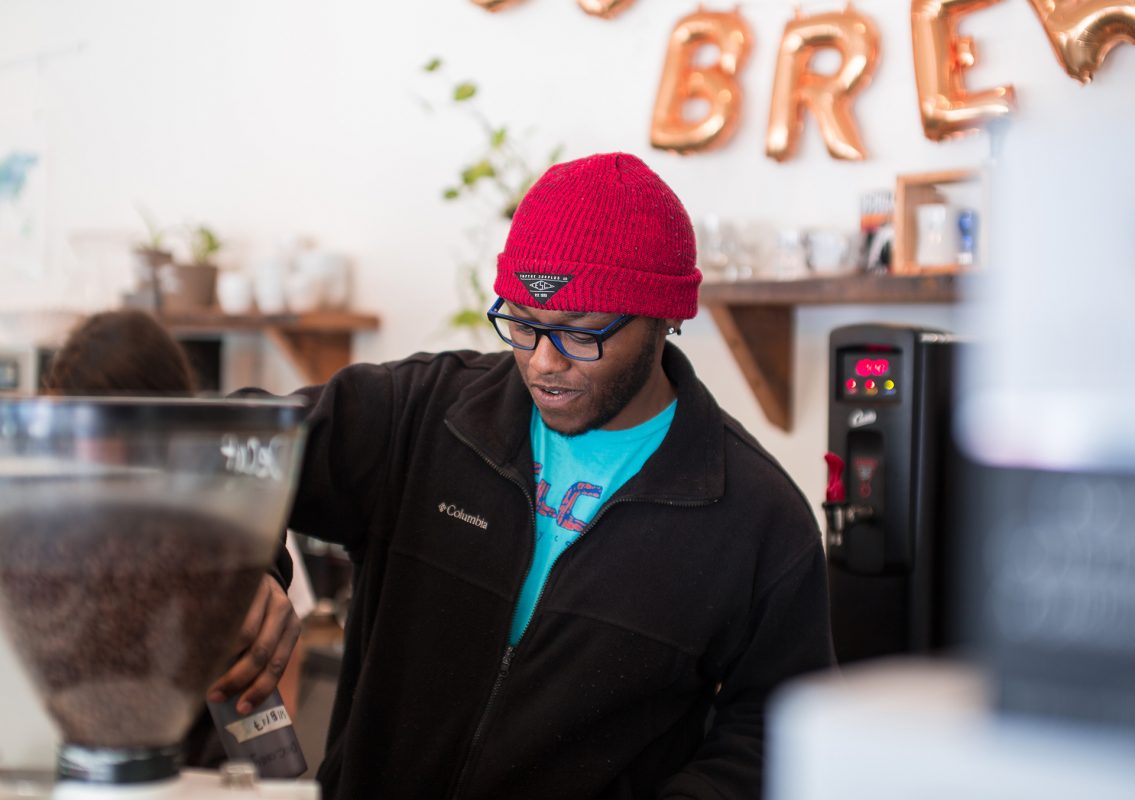
Anthony Harris has worked at the cafe for over four years, beginning in the apprenticeship program. He’s now a shift supervisor at Street Bean’s flagship Belltown location. Harris didn’t plan to work in coffee. He was a five-year high school student, and through a job placement program at his alternative school, he landed at Street Bean.
“Sure, I’ll try coffee,” Harris remembers thinking to himself. “I don’t drink coffee very much, but I’ve always wanted to learn about how it works.”
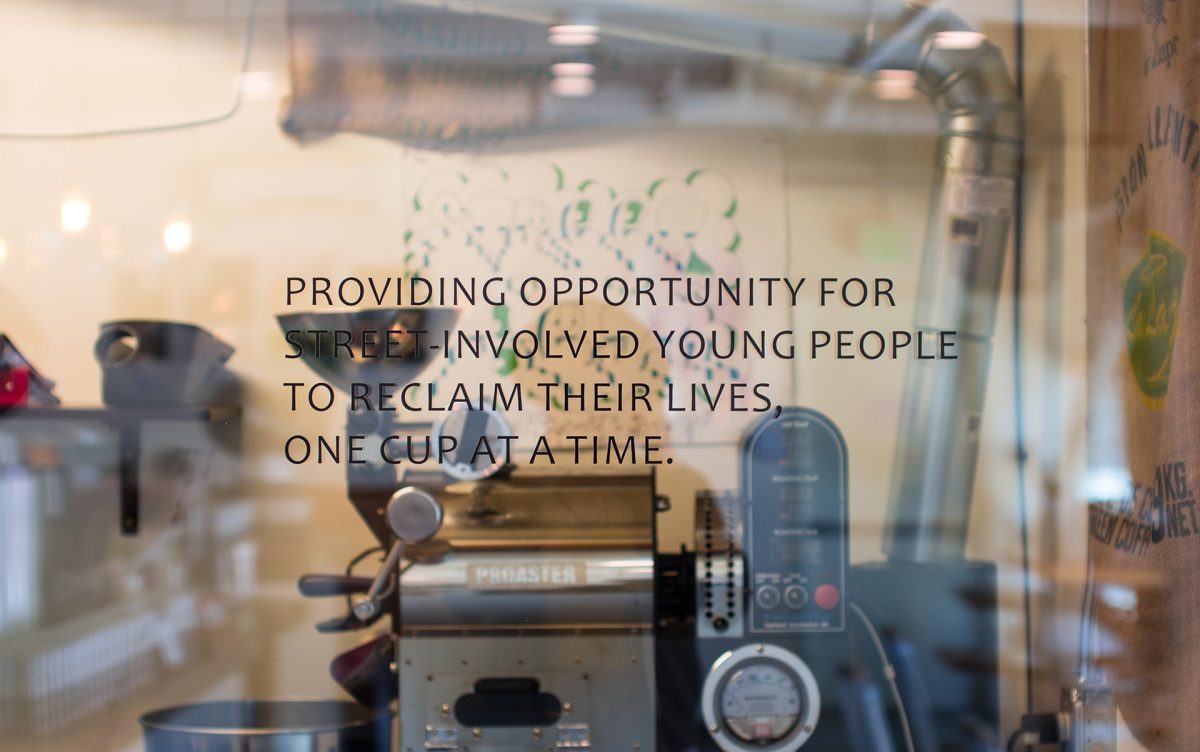
Street Bean started out in the “second wave” of coffee when it first opened its doors in November 2009. In the years following, its coffee program moved towards contemporary specialty, allowing baristas more in-depth training. A Street Bean apprenticeship now includes a six-month training program that runs through customer service, filter brewing methods, espresso, and milk steaming, which includes latte art. (Sprudge covered the shop’s fifth-anniversary party, which featured a slew of fun staff-conceived signature drinks, in 2014.)
The Street Bean name is familiar to nearby cafes like the La Marzocco Cafe, Honor Coffee, Cherry Street, and Drip City, and building good rapport with them is essential to ensuring the success of apprentices once the program is over. “We encourage our apprentices to go and do their own personal networking to find jobs after Street Bean. We have a few graduates who’ve continued to work in coffee, and others have found jobs elsewhere,” says McDonald.
In an industry still struggling to overcome sex, race, and class bias, Street Bean’s program is quietly combatting these factors by offering as many opportunities as possible to their staff.
“We went to the barista competition [at this past SCA Expo], and it was so cool,” Ynga Chernogradskaia, a current apprentice at Street Bean, tells me. “I realized that being a barista is much more than a service job. It’s a whole culture.”
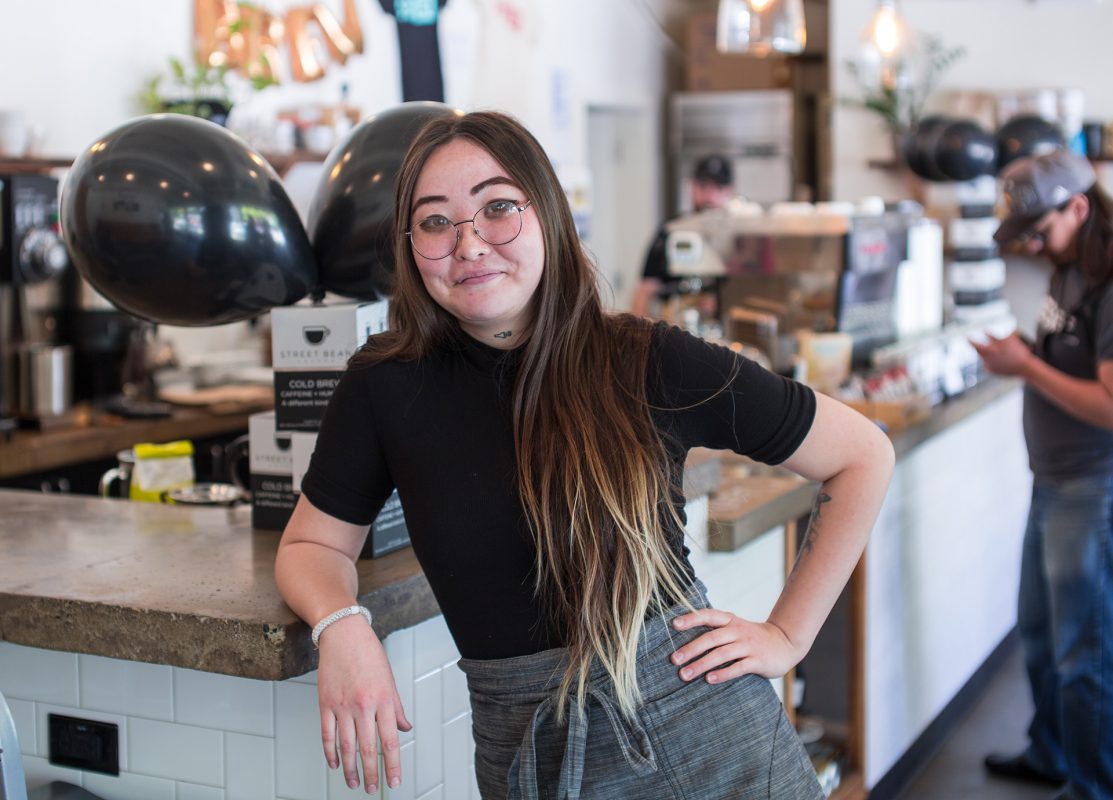
Chernogradskaia is a Russian refugee—and queer woman of color—seeking political asylum here in the United States. Her story is a poignant example of how meaningful opportunities like those afforded by Street Bean can be.
Russia’s extreme social and political climate made life for Chernogradskaia not only dangerous but life-threatening. Seeking a way out, Chernogradskaia came to the United States as an exchange student, and when the program ended, she decided to stay. Having settled initially in Bozeman, Montana, where she still felt visibly different than the surrounding community, she then decided to explore Seattle.
“I heard Seattle was one of the most tolerable cities for people of color to live in, so I moved,” said Chernogradskaia.
For six months, Chernogradskaia lived in multiple homeless shelters before she was led to New Horizons, and eventually an apprenticeship at Street Bean. “I was really concerned about working here, at first, though I didn’t have a choice. In Russia, there’s no good coffee. I thought I hated coffee but that was because I’d never tried good coffee,” she admits.
She remembers her manager serving her an espresso and latte for the first time. “Oh my god.” I watched as her face lit up and she mimed worshipping two invisible coffee cups. “It was so good. I fell in love with coffee. I ended up drinking way too much for a whole month after.”
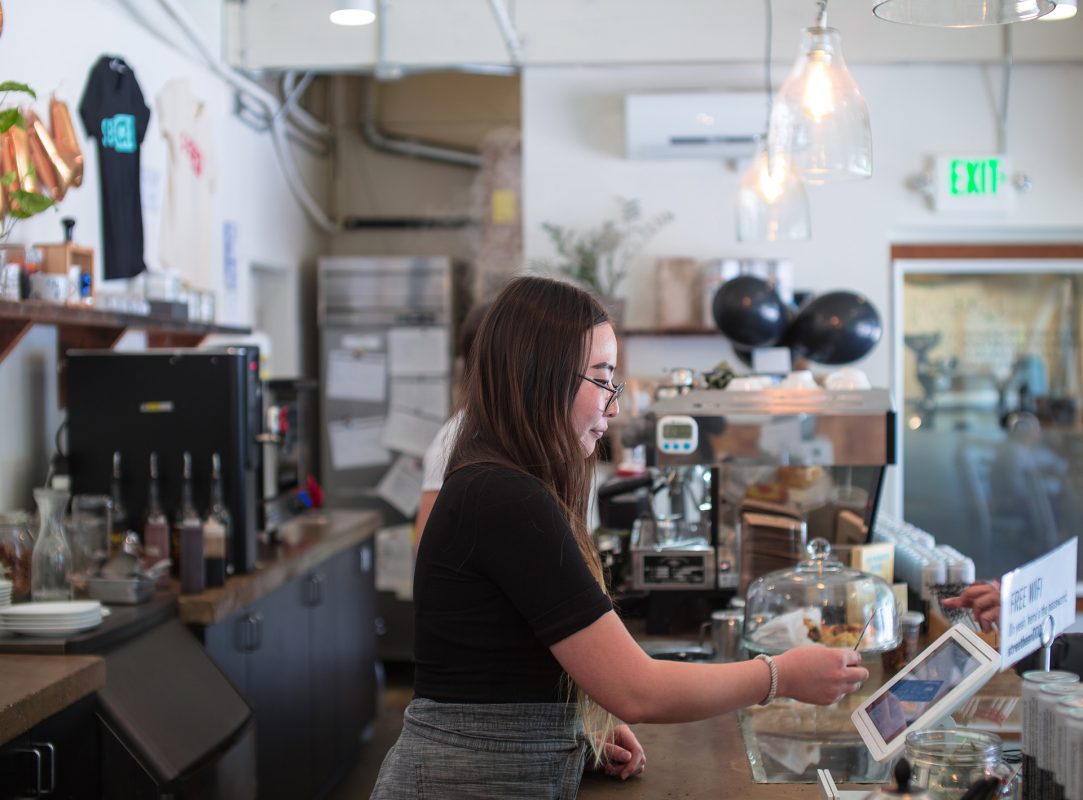
Unlike Harris, who plans to finish a college degree in accounting and pursue a career in finance, Chernogradskaia wants to stay in coffee.
“I want to be a barista competitor,” she says with confidence. “Slate [Coffee Roasters] is my favorite shop, and it would be amazing to work there after my apprenticeship.”
Hearing Chernogradnskaia’s story led me to a realization I always knew but was experiencing for the first time with Street Bean: coffee is truly a beverage of massive impact, and it does not conform to any singular way of pursuit. Coffee is scientific, technical, social, and political. To people like Ynga Chernogradskaia, Anthony Harris, others in the Street Bean family, and me, coffee is an opportunity for a better life.
And now, with the official launch of Street Bean canned cold brew, made in partnership with Seattle-based company Schilling Cider, the company is taking that impact even further. Bartell Drugs in the Seattle area is already stocked with Street Bean Cold Brew and soon, other major grocers will be, too. For every can purchased, a portion of the proceeds goes back to Street Bean to continue running the apprenticeship program. McDonald is excited for the opportunity to explore this venture with Schilling. “It’s a really cool way for us to get our name and our story out there.”
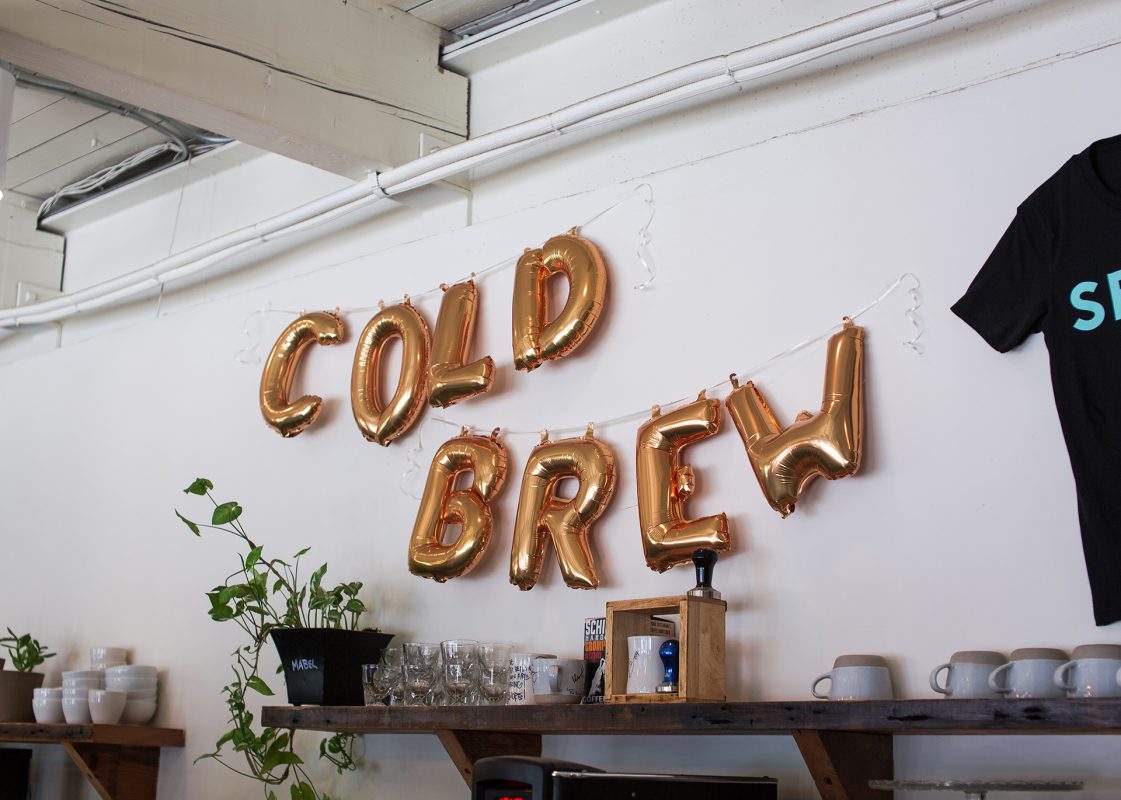
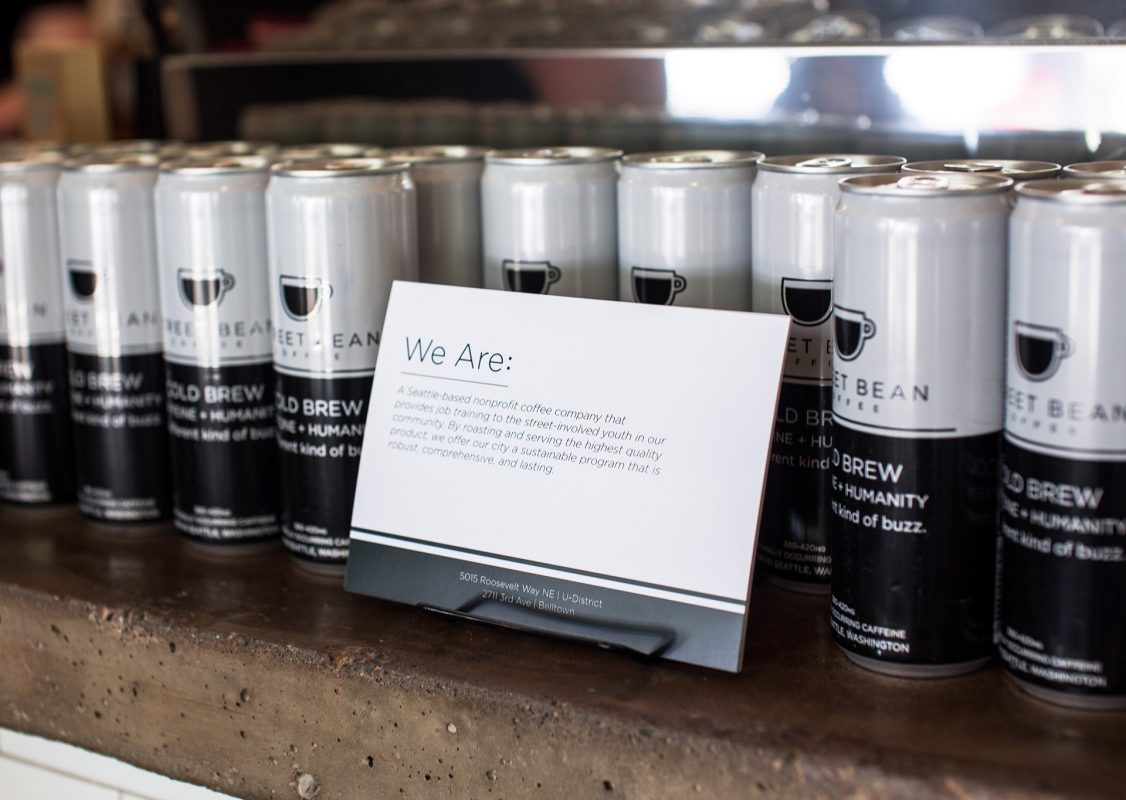
Street Bean has also recently opened a second location up north in the U-District and has hopes to expand its roastery into a fully equipped training lab in the next year.
Though despite the program’s growth, it’s largely designed as a stepping stone to further-flung pursuits. When apprentices graduate from the program, both Street Bean and New Horizons staff take time to celebrate them on their journey to the next step of self-sufficiency. Some are offered permanent positions at the shop, like Harris for example, while other past apprentices have moved elsewhere. No matter the path taken after Street Bean, most do walk away with more preparedness than before for any obstacles that may come their way.
“I have financial stability,” says Harris, “And I can take care of my family.”
Chernogradskaia, too, beams when she talks about Street Bean. “It’s amazing all of the opportunities they give you to learn about coffee. I’m happier now. I have friends. I have a job. I have a home.”
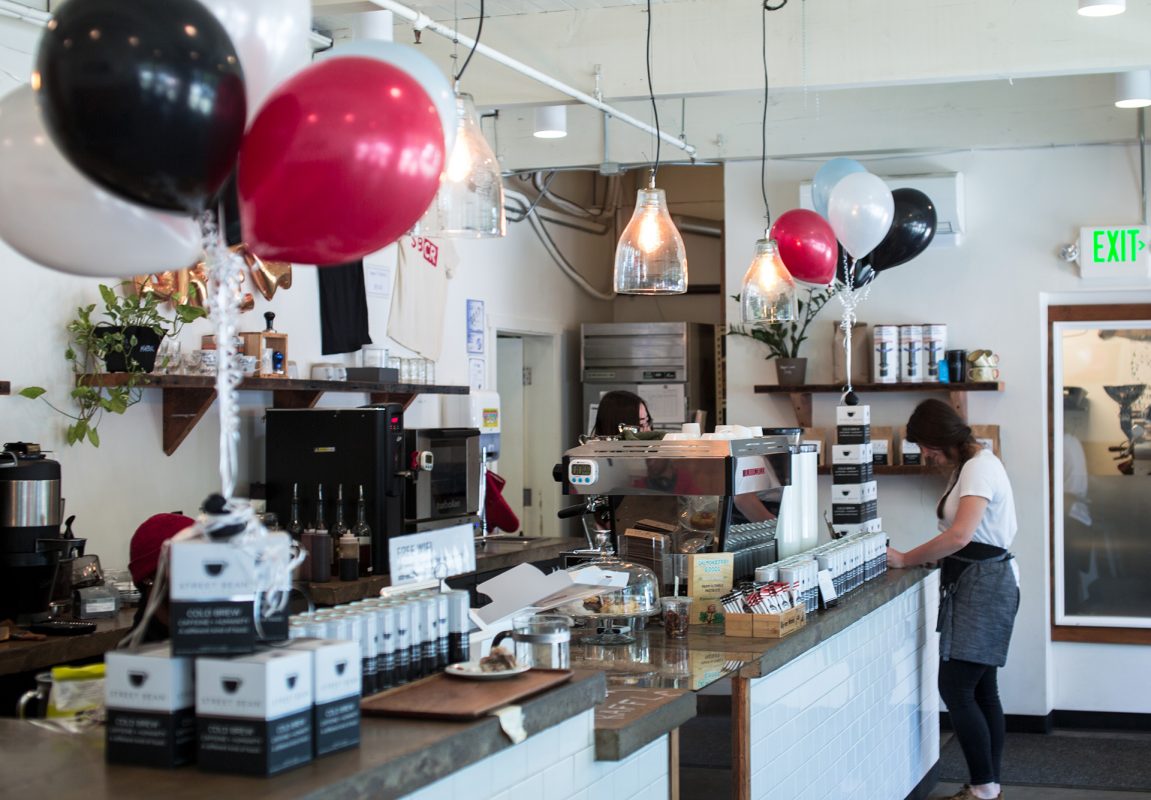
Visiting Street Bean, reminders of how powerful the coffee world can be are all around you. From the care taken in preparing coffee innovatively, the conscientiousness towards sourcing the product itself, to the immediate, street-level difference it’s making in baristas’ lives. Like them, I’ve found in coffee a particularly special substance that’s nurtured, inspired, and empowered me. There’s no question that for them, and for me, coffee has made a difference.
Michelle Johnson (@thechocbarista) is the publisher of The Chocolate Barista, and the marketing director at Barista Hustle. Read more Michelle Johnson on Sprudge.
The post At Seattle’s Street Bean, A Better Life In Coffee appeared first on Sprudge.
seen 1st on http://sprudge.com
No comments:
Post a Comment